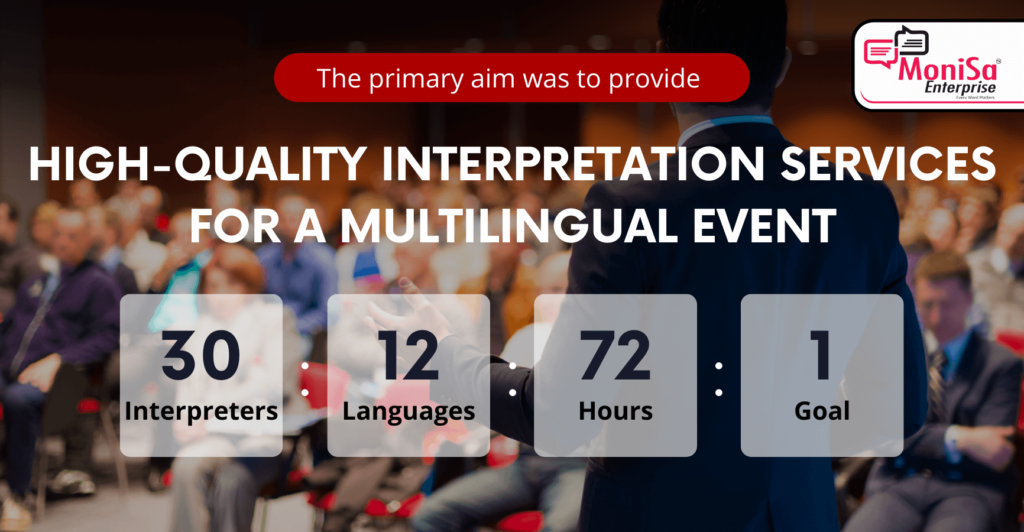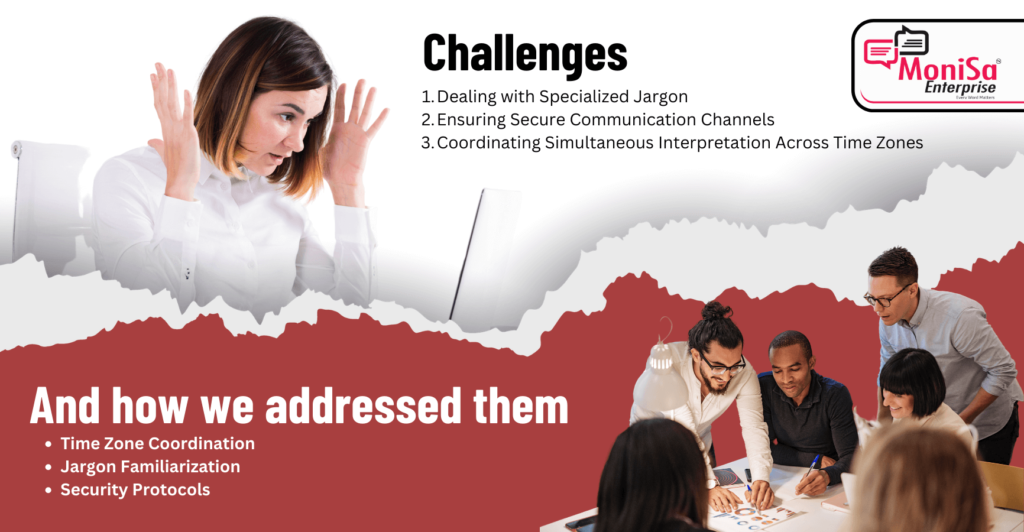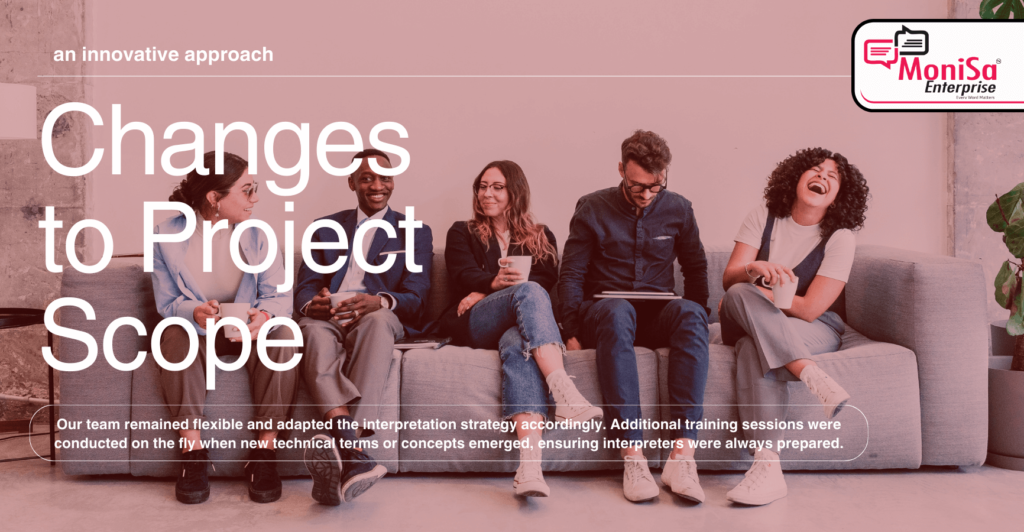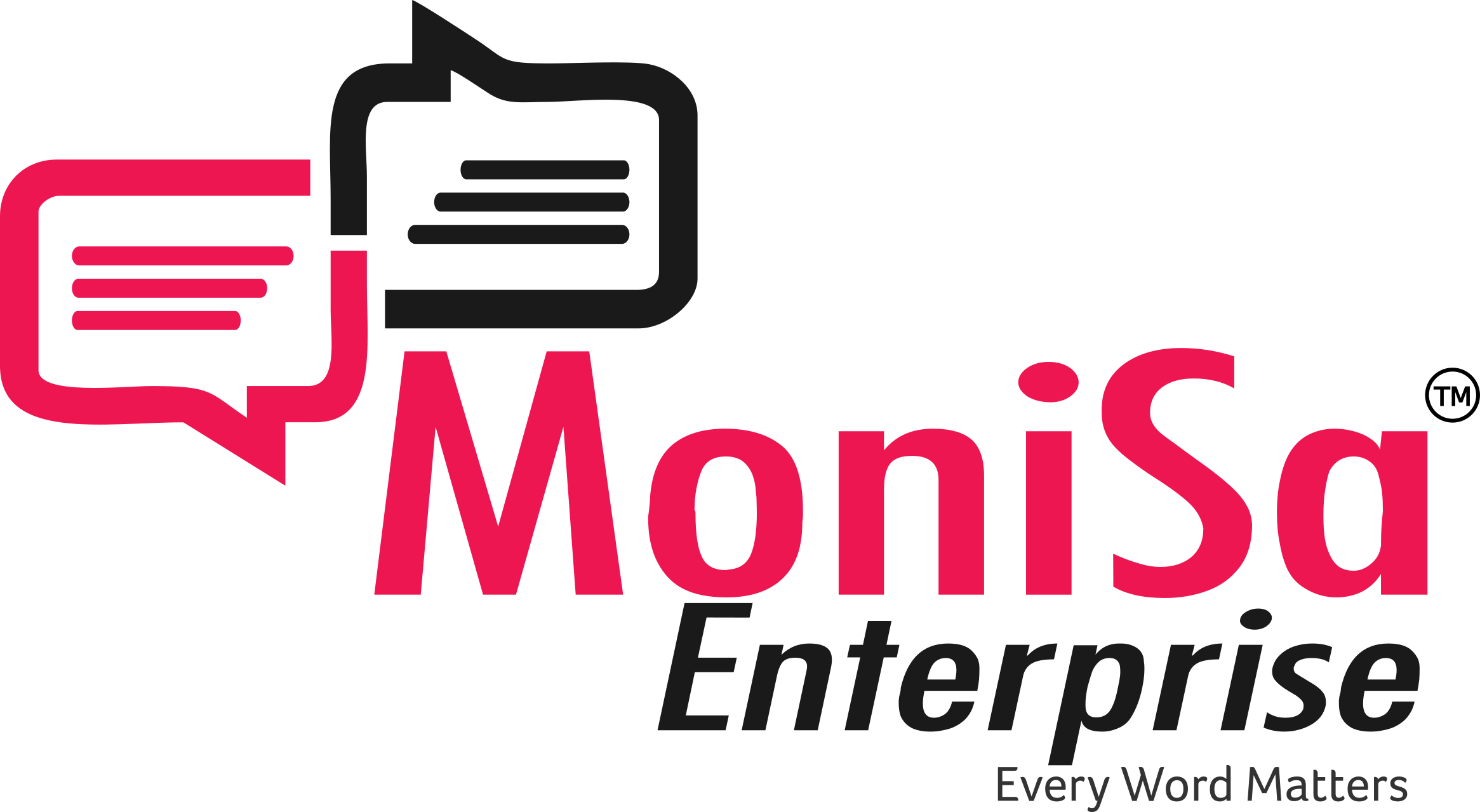In a world where cyber threats evolve by the minute, how do you ensure seamless communication at a global cybersecurity conference with participants speaking multiple languages?
Imagine managing live interpretations across time zones, ensuring airtight security for sensitive discussions, and delivering complex, technical jargon accurately—simultaneously. This was the challenge MoniSa Enterprise tackled head-on for an international cybersecurity conference.
Scenario:
In October 2023, MoniSa Enterprise took on a challenging yet rewarding project—providing interpretation services for an international cybersecurity conference. This hybrid event combined both in-person and virtual elements, gathering participants from across the globe to discuss the latest developments and threats in cybersecurity. Given the high stakes of the subject matter, discussions involved sensitive and highly technical topics. These required simultaneous interpretation across various languages, making this project particularly complex due to the specific jargon and security protocols necessary to protect confidential information.
Complexity:
The project posed significant logistical, technical, and security challenges:
- Simultaneous Interpretation: Managing interpreters working across different time zones.
- Specialized Jargon: Ensuring interpreters were familiar with highly technical cybersecurity terminology.
- Security Requirements: Ensuring all communication, both in-person and virtual, adhered to strict security protocols to protect sensitive information.

Languages Involved:
Participants communicated in a range of languages, including but not limited to:
- English
- Mandarin
- Spanish
- French
Given the global nature of the conference, additional languages were facilitated as needed based on participant requirements.
Project Scope and Objectives:
Primary Objective:
The primary aim was to provide high-quality interpretation services for this multilingual event, ensuring seamless communication across languages while safeguarding the integrity and confidentiality of the cybersecurity discussions.
The project’s scope included:
- Simultaneous interpretation for hybrid sessions (both virtual and in-person).
- Management of technical discussions involving specialized cybersecurity terminology.
- Securing communication channels to ensure all information shared was protected from potential breaches or leaks.
Secondary Objectives:
In addition to delivering precise interpretation, the project also sought to:
- Create an efficient schedule that accounted for various time zones to ensure that all interpreters were available when needed.
- Offer security-enhanced virtual platforms for remote participants.
- Maintain client satisfaction by managing relationships and communication effectively throughout the project.
Team Members Involved:
- Professional Interpreters: When a technical glitch occurred, our lead interpreter was quickly improvised by Multilingual experts proficient in the languages required for the event, with specialized training in cybersecurity terminology.
- Technical Support Staff: Responsible for managing the interpretation equipment, including booths, headsets, and microphones, as well as virtual platforms.
- Event Coordinators: Overseeing logistics, scheduling, and the overall management of the event.

Technologies/Software Utilized:
1. Interpretation Equipment: High-quality interpreter booths, headsets, microphones, and other AV equipment were used for in-person attendees. 30 interpreters covering 12 languages over 72 hours of sessions.
2. Virtual Conferencing Platforms: To accommodate remote participants, we employed secure and reliable virtual platforms tailored to hybrid events. These platforms were equipped with advanced security features such as end-to-end encryption to protect sensitive conversations.
Major Challenges Encountered:
1. Coordinating Simultaneous Interpretation Across Time Zones: Given the global nature of the event, one of the primary logistical hurdles was ensuring interpreters and participants across different time zones were synchronized. With delegates tuning in from Asia, Europe, North America, and beyond, we needed to guarantee that no language service would be missed due to time zone discrepancies.
2. Dealing with Specialized Jargon: Cybersecurity is a highly technical field filled with complex terminologies and acronyms. Interpreters not only needed to be proficient in the respective languages but also well-versed in the specific vocabulary relevant to the field. Failure to accurately convey technical details could result in miscommunication of critical information.
3. Ensuring Secure Communication Channels: Given the sensitive nature of cybersecurity discussions, ensuring that communication channels were entirely secure was paramount. We needed to establish protocols for data encryption and secure transmissions to ensure the confidentiality of all information exchanged during the conference.
Challenges Addressed:
1. Time Zone Coordination: We developed a detailed scheduling system that took into account the time zones of interpreters and participants. Our coordinators established clear communication with all parties to confirm availability during conference sessions, ensuring interpreters were online and ready when needed. The use of a time zone matrix helped prevent any conflicts or delays.
2. Jargon Familiarization: In preparation for the event, our interpreters participated in extensive cybersecurity training. This included building a shared glossary of technical terms and engaging in mock sessions to familiarize themselves with key concepts and language. This proactive approach ensured that interpreters were not only translating accurately but also providing clear and concise interpretations of technical discussions.
3. Security Protocols: To meet the security needs of the client, we employed virtual platforms with state-of-the-art encryption protocols. All communications, both during in-person sessions and virtual engagements, were encrypted. We also ensured that interpreters and technical support staff were trained in maintaining secure communication practices throughout the event.

Total Volume of Work:
The conference spanned three days, with multiple sessions held daily. The total volume of interpretation services provided was determined by the number of sessions, the duration of each session, and the number of languages required. Each day’s agenda was packed with highly technical content, increasing the need for interpreters with deep knowledge of cybersecurity.
Changes to Project Scope:
During the conference, as is common in events of this scale, last-minute changes to the agenda and discussion topics were introduced. Our team remained flexible and adapted the interpretation strategy accordingly. Additional training sessions were conducted on the fly when new technical terms or concepts emerged, ensuring interpreters were always prepared.
Innovations/New Approaches:
Several innovative approaches were implemented to ensure the success of the project:
- Virtual Conferencing Platforms: Our use of advanced, secure platforms facilitated smooth participation from remote attendees without compromising on the quality or security of the communication.
- Security Protocols: Encryption of all communication channels was a non-negotiable aspect of the project. The integration of cybersecurity-specific protocols into our interpretation services represented a major innovation, especially for a hybrid event.
- Comprehensive Training for Interpreters: The integration of pre-conference training focused on technical jargon was critical in this project. This level of specialization in training ensured that interpreters were fully prepared to manage complex discussions, thereby reducing the risk of miscommunication.
Client Satisfaction:
Client satisfaction was measured on several fronts:
- Seamless coordination: The client praised the smooth execution of the time zone scheduling and the ability to manage interpreters across different global regions without any disruptions.
- Accurate conveyance of technical discussions: Feedback from participants indicated high satisfaction with the quality of interpretation, particularly the ability of interpreters to clearly communicate technical and specialized cybersecurity topics.
- Successful security protocols: The client reported zero incidents of data breaches or communication failures during the event, reinforcing their trust in our services.

Future Projects/Collaborations:
The successful execution of this project has opened doors for potential future collaborations. Based on this experience, the client is already exploring options for MoniSa Enterprise to support interpretation services at future international events, especially within the cybersecurity and technology sectors.
Client Industry:
Cybersecurity, technology, and international events.
Client Organization Size: Large-scale organizations, likely including government agencies, industry stakeholders, and multinational corporations involved in cybersecurity.
Relationship Management:
Maintaining strong relationships was crucial to the project’s success. Throughout the event, MoniSa Enterprise established regular feedback loops with the client, ensuring open channels of communication and resolving any issues promptly. This proactive relationship management fostered trust and paved the way for future collaboration opportunities.
Conclusion:
MoniSa Enterprise successfully delivered a complex and sensitive interpretation project for an international cybersecurity conference, overcoming challenges related to time zones, technical jargon, and security protocols. By implementing innovative solutions and maintaining a flexible, client-centric approach, the team ensured seamless communication and a highly secure environment for all participants. This project stands as a testament to MoniSa’s ability to manage high-stakes, multilingual events with precision and professionalism.
